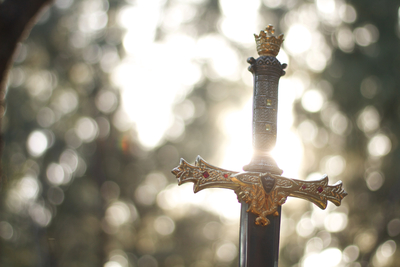
Through the centuries, King Arthur has been known as a man whose sword and kingdom were inseparable from his soul. I’ve read many versions of the legend, because I’ve always had the heart of a romantic. Tolkien’s Aragorn attracted me so much as a child that he and his Andúril pretty much became a part of my own soul. So much romance is associated with the sword! They’ve been in use for millennia, and, worldwide, we’ve been romanticising war for millennia.
When we name a weapon, as we do a ship, we humanize it in some way—recognizing it as having a spirit. For much of history, both ships and swords have been profoundly important as means of achieving and keeping power. Therefore, we honor and respect the names. And there are countless swords of renown. History and mythology give us Charlemagne’s Joyeuse, the Islamic Zulfiqar, and the Heaven's Will of Lê dynasty Vietnam. Sword names are often earned, building stories to hand down through the generations.
Many times, more than people, swords took center stage in the stories which were handed down. And yet, they were not the mainstays of battle. The clank of steel, the snorting of horses, these we expect in battle scenes. But in real life, over most of history, battles were fought by formations of men, and it was pole arms such as the pike that predominated. Any man could handle a pole arm, it didn’t require skill. Swords were for the nobility, and this is why they persevere as symbols of glory.
Across the continents, swords are a symbol of war, destruction, protection. Divine authority. Valor. Justice. When a weapon is a symbol of justice, though, one really needs to question if that perspective might be a bit one-sided.
In some traditions the sword symbolizes purification, the cutting away of unhealthy thoughts, piercing the mystery of ourselves in order to gain the freedom of enlightenment. How does a sword slice away impure thoughts and ignorance? Why use the metaphor of a sword rather than, say, a kitchen knife to rid ourselves of distractions and unhelpful ideas? Well, swords are powerful. They are instruments of death. So I suppose the idea is that swords kill the adversaries: these unwanted thoughts.
Like most of us, I am a long way from enlightenment, but I see that when we do bring ourselves to inner peace we understand that there are no “bad guys.” These are only things that are out of place. In some indigenous traditions, all sickness is caused by something that is where it shouldn’t be. The world doesn’t have to be seen as good versus evil.
The fascination with battle is so deeply a part of us, I don’t think it’s really going anywhere. But we can be aware. We can choose what to focus on. Find a balance. Badass sword-brandishing goddesses have their place, and there is no story without conflict. But there are a zillion things that can go wrong in life; fantasy writers needn’t always fall back on the easy theme of war for meaningful and engaging challenges.
When the power of love overcomes the love of power, the world will know peace. — Jimi Hendrix

